We will stay firmly rooted in Chinese culture. We will collect and refine the defining symbols and best elements of Chinese culture and showcase them to the world. We will accelerate the development of China’s discourse and narrative systems, better tell China’s stories, make China’s voice heard, and present a China that is credible, appealing, and respectable.
为世界提供更多启迪和机遇
——海外人士盛赞习近平引领新时代中国进一步全面深化改革
发布时间:2024-07-18 09:05:20 | 来源:新华网 | 作者: | 责任编辑:曹川川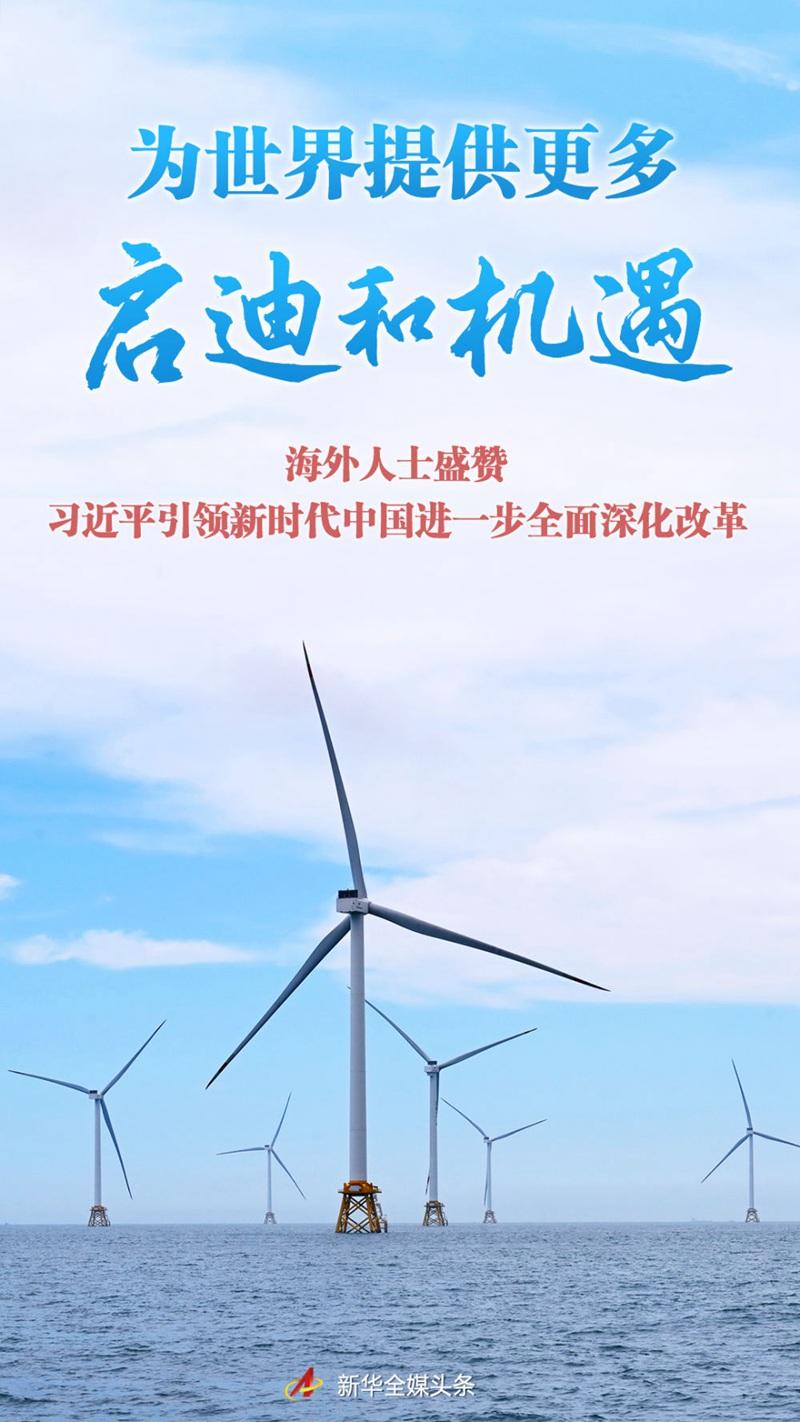
“中国的改革促成了当代人类历史上最伟大的经济转型,甚至也堪称是迄今全部人类历史上最伟大的经济转型。”英国学者马丁·雅克说。
“要了解中国下一阶段的全面深化改革,可以从习近平对中国的思考入手。”美国库恩基金会主席罗伯特·劳伦斯·库恩说。
改革开放是中国和世界共同发展进步的伟大历程。海外人士普遍认同习近平关于改革开放的重要论述——“中国进行改革开放,顺应了中国人民要发展、要创新、要美好生活的历史要求,契合了世界各国人民要发展、要合作、要和平生活的时代潮流。”“改革开放这场中国的第二次革命,不仅深刻改变了中国,也深刻影响了世界!”
中共二十届三中全会召开,世界瞩望中国进一步全面深化改革、推进中国式现代化给各国共同发展和人类文明进步带来更多机遇,为建设和平、稳定、繁荣、更加美好的世界提供更多启迪。
“展现出强大勇气和领导力”
“容易的、皆大欢喜的改革已经完成了,好吃的肉都吃掉了,剩下的都是难啃的硬骨头。这就要求我们胆子要大、步子要稳。”习近平主席在接受俄罗斯电视台专访时的这一论述给韩国全球战略合作研究院院长黄载皓留下深刻印象。他说,改革是由问题倒逼产生,又在不断解决问题中得以深化。面对新型矛盾、改革难题,习近平设定正确的前进方向,同时展现出坚定信心。
海外人士评价,在中国全面深化改革的征程上,习近平主席勇毅担当高举改革大旗,科学谋划为改革掌舵领航,笃行实干成就中国式现代化新路。“习近平的远见很好地应对了挑战。在改革道路上,他带领中国迈向发展新阶段。”尼日利亚中国研究中心主任查尔斯·奥努纳伊朱说。
十年多来,习近平总书记亲自挂帅中央全面深化改革委员会(领导小组),主持召开72次中央深改领导小组和中央深改委会议,部署了一系列重大改革事项,指引各方面出台3000多项改革方案,覆盖经济、政治、文化、社会、生态文明、党的建设、国防和军队等各个领域。
加纳智库非中政策咨询中心执行主任保罗·弗林蓬表示,“习近平引领的改革涵盖领域广泛、内容深刻,及时、有力回应了中国在新时代面临的内外部挑战”。
“习近平是通过实干来领导的。”约旦侯赛因·本·塔拉勒大学教授哈桑·达贾说,习近平亲自领衔、部署一系列重大改革事项,“他认真审阅重大改革方案的每一稿,甚至逐字逐句亲笔修改”。这样的实干精神,令达贾钦佩。
十年多来,中国的改革在各个领域扎实推进、不断突破,许多领域实现历史性变革、系统性重塑、整体性重构。
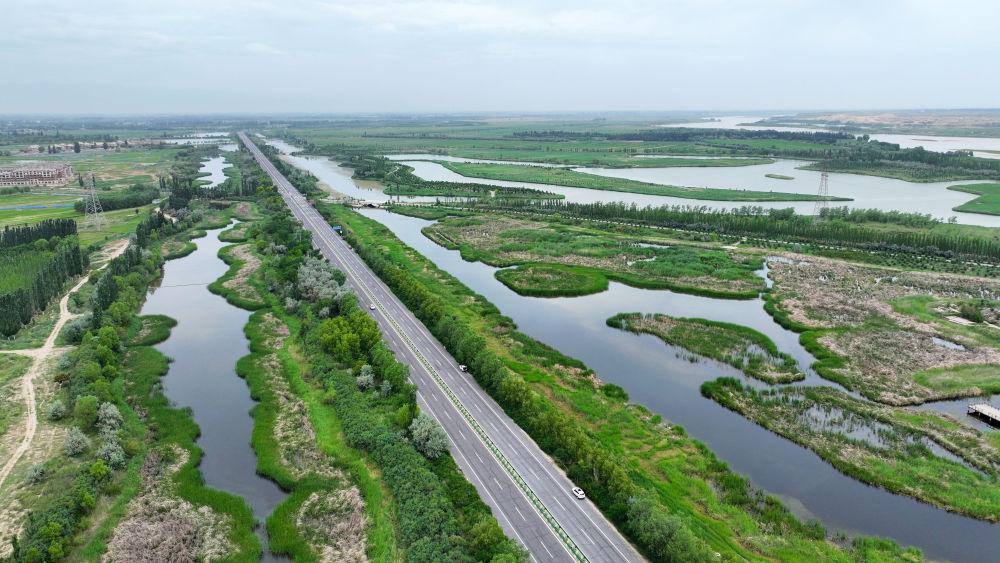
这是2024年6月13日拍摄的黄河宁夏段滨河大道(无人机照片)。近年来,宁夏努力建设黄河流域生态保护和高质量发展先行区,全力打好黄河保护持久战。新华社记者 王鹏 摄
联合国前副秘书长埃里克·索尔海姆高度评价中国在推动生态环境治理和经济协调发展方面取得的成就:“中国已成为全球绿色发展的中坚,其他任何国家想在没有中国参与的情况下实现绿色发展,都将付出更多时间、更大代价。”
俄罗斯国家杜马(议会下院)国际事务委员会第一副主席德米特里·诺维科夫长期深入研究中国共产党执政理念与实践。他说,每次访华都给他留下深刻印象,新的城市街区不断发展,工业园区加快建设,越来越多高速交通线路正在铺设。“习近平担任党和国家最高领导人以来,中国在全面深化改革的旗帜下不断前进。”
达贾表示,过去短短几年间,中国民众的生活水平得到明显改善,这正是深化改革的成果。“习近平展现出强大的勇气和领导力,坚决应对挑战并在改革道路上前进。”
“为世界前进提供了新的思路,带来了新的启迪”
“习近平具有战略眼光,他为全面深化改革构建了一套独特而科学的方法论,这是改革成功的关键。”新加坡时政评论员翁德生说。
海外人士认为,中国的改革举措和现代化发展道路为世界,尤其是广大发展中国家提供了启示和范例,其中蕴含的理念和智慧值得各国改革者学习借鉴。
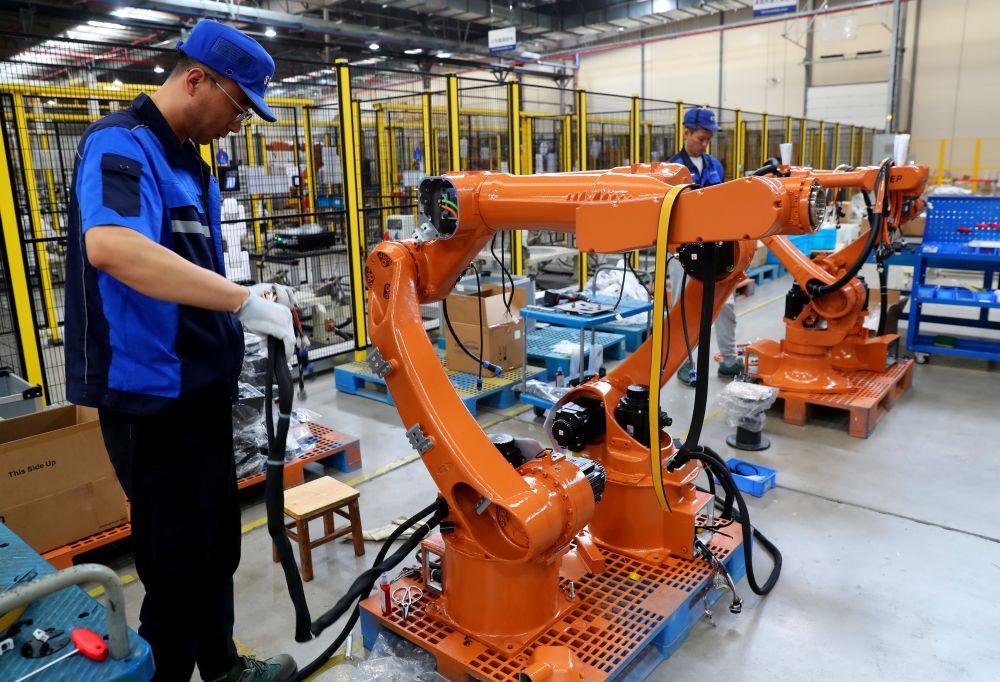
工作人员在上海新时达机器人有限公司位于嘉定的智能工厂内忙碌(2024年5月23日摄)。新华社记者 龚兵 摄
索尔海姆说,习近平主席的智慧体现在对中国发展全局的把握上。从推动生态治理到倡导高质量发展,从铁腕反腐到脱贫攻坚,再到提出推动科技创新和发展新质生产力,“这些思想为驱动中国发展提供了不竭动力”。
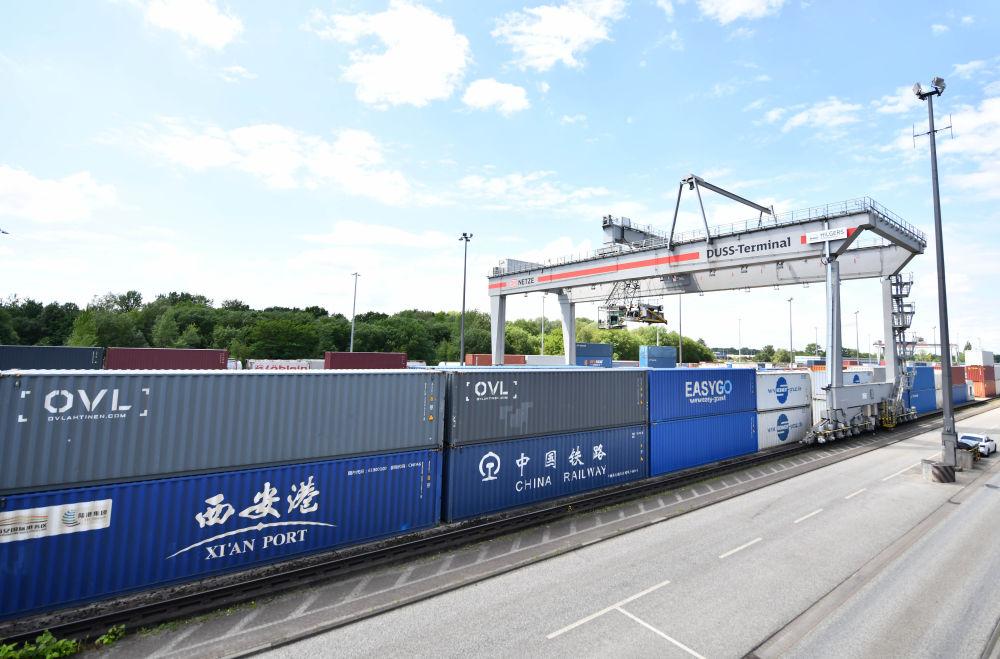
这是2024年5月27日拍摄的德国汉堡-比尔韦尔德DUSS货运场站。新华社记者 任鹏飞 摄
德国联邦经济发展和对外贸易协会主席米夏埃尔·舒曼非常关注新质生产力这一概念。在他看来,这涉及人工智能和数字基础设施,核心是以此来改善人们的生活。“我们正在深入研究,观察中国式现代化将如何继续发展,以及西方可以从中学到什么。”
古巴哈瓦那大学国际经济研究中心资深研究员路易斯·费尔南德斯认为,习近平主席阐述和提出的改革理念是正确的,因为这些理念坚持以人民为中心,并且基于对全球经济整体环境和国际政治经济关系复杂性的科学分析。
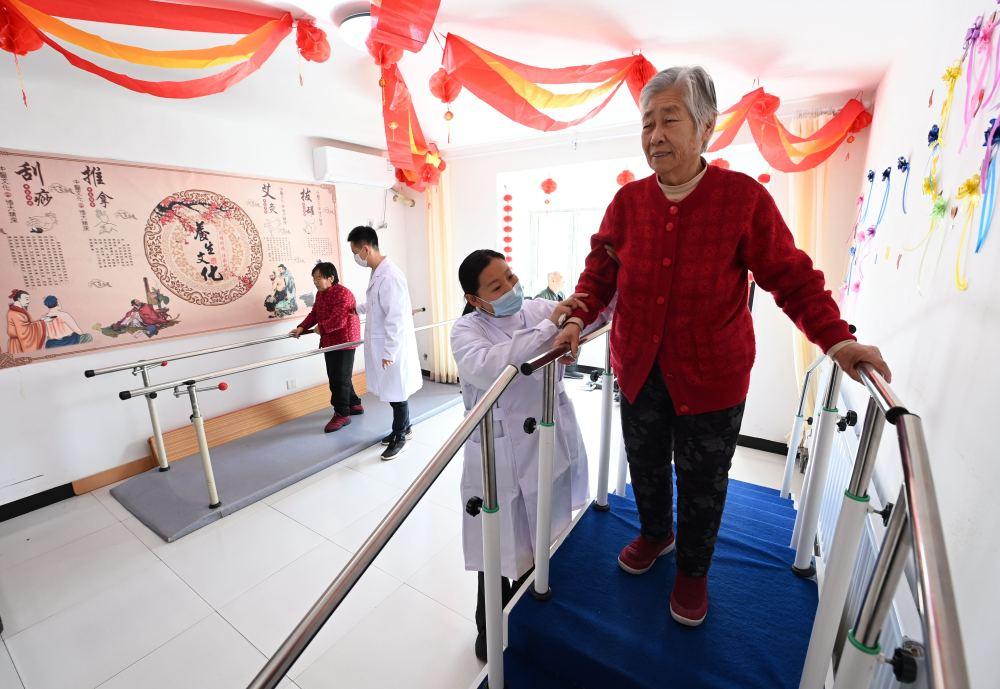
在河北省香河县安平镇运河新村医养中心,老年人在进行康复训练(2024年2月29日摄)。新华社记者 王晓 摄
“抓改革、促发展,归根到底就是为了让人民过上更好的日子”“中国式现代化,民生为大”“老百姓关心什么、期盼什么,改革就要抓住什么、推进什么,通过改革给人民群众带来更多获得感”……海外人士尤其注意到,在引领新时代中国全面深化改革过程中,人民始终在习近平主席心中居于最重要的位置。
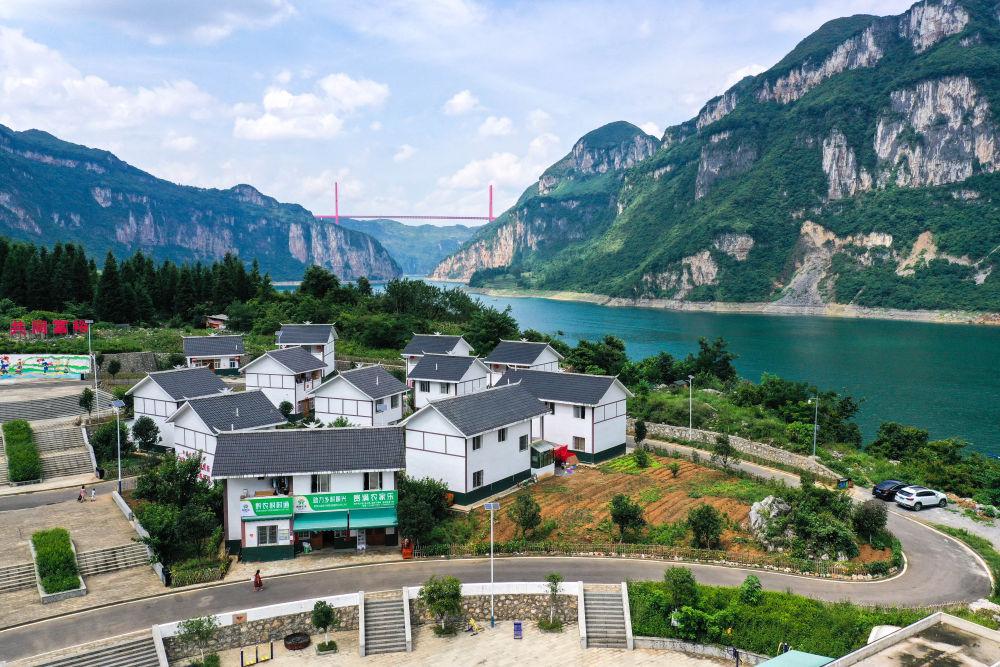
这是贵州省黔西市新仁苗族乡化屋村麻窝寨易地搬迁集中安置点(2021年7月24日摄,无人机照片)。新华社记者 杨文斌 摄
坦桑尼亚达累斯萨拉姆大学中国研究中心主任汉弗莱·莫西表达了对习近平主席“为了人民无私奉献”的感动与钦佩。他说:“习近平主席始终坚持‘以人民为中心’,推动一系列改革措施,旨在提升人民生活水平,改善民生。从精准扶贫到全面小康,从教育改革到医疗保障,他所指引推动的政策切实回应了人民的需求,展现了对人民的深厚情怀和责任担当。”
“以人民为中心,体现在公平正义的制度安排上,体现在真抓实干的务实作风上。”柬埔寨柬中关系发展学会会长谢莫尼勒说,这让人民既成为改革的实践者,又成为改革的受益者,打通了中国快速发展的脉络,推动改革开放不断走向深入。
“习近平懂得用心、用思想来回应人民需求。他发起的改革是成功的,这些改革符合人民的利益,因而获得人民的认同。”诺维科夫说,中国的领导者“牢记来自人民、为人民服务”,这是中国与西方国家的一个重要区别。
“习近平心中的人民,不仅是中国人民,也是世界人民。”中国改革友谊奖章获得者、英国48家集团俱乐部名誉主席斯蒂芬·佩里感慨,习近平深刻认识和理解辩证法与矛盾论,并将马克思主义与中国实际相结合,找到了适合中国发展的道路。在世界迷失的时刻,这条道路为世界前进提供了新的思路,带来了新的启迪。
十年多来,伴随着全面深化改革在广度和深度上不断拓展,中国特色社会主义制度更加成熟,国家治理体系和治理能力现代化水平不断提高,中国式现代化展现出光明前景。
斯里兰卡国际问题专家亚西鲁·拉纳拉贾说:“在习近平领导下,中国式现代化在减贫、科技创新以及绿色可持续发展等领域都为世界创造了新范式。”智利前驻华大使费尔南多·雷耶斯·马塔表示,“中国式现代化是非常深刻、有力的概念,它改变了现代化的范式”,在全球南方国家中引发了广泛回响。
“为推动解决人类重大问题提供愿景和规划”
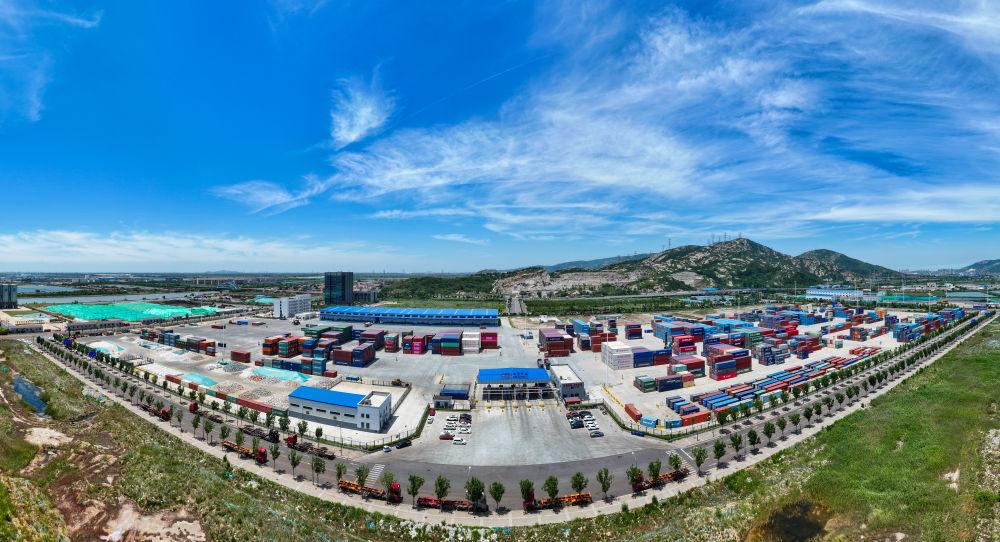
2024年6月26日拍摄的位于江苏省连云港市连云区的上合组织(连云港)国际物流园内的中国外运集装箱场站(无人机照片)。上合组织(连云港)国际物流园是连云港建设“一带一路”交汇点强支点和上合组织国家出海基地的重要平台载体。新华社记者 季春鹏 摄
“启运!”7月初,习近平主席访问哈萨克斯坦期间,同哈总统托卡耶夫以视频方式共同出席了中欧跨里海直达快运开通仪式。11年前,正是在哈萨克斯坦,习近平主席首次提出共建“丝绸之路经济带”倡议。如今,已有150多个国家、30多个国际组织签署共建“一带一路”合作文件。
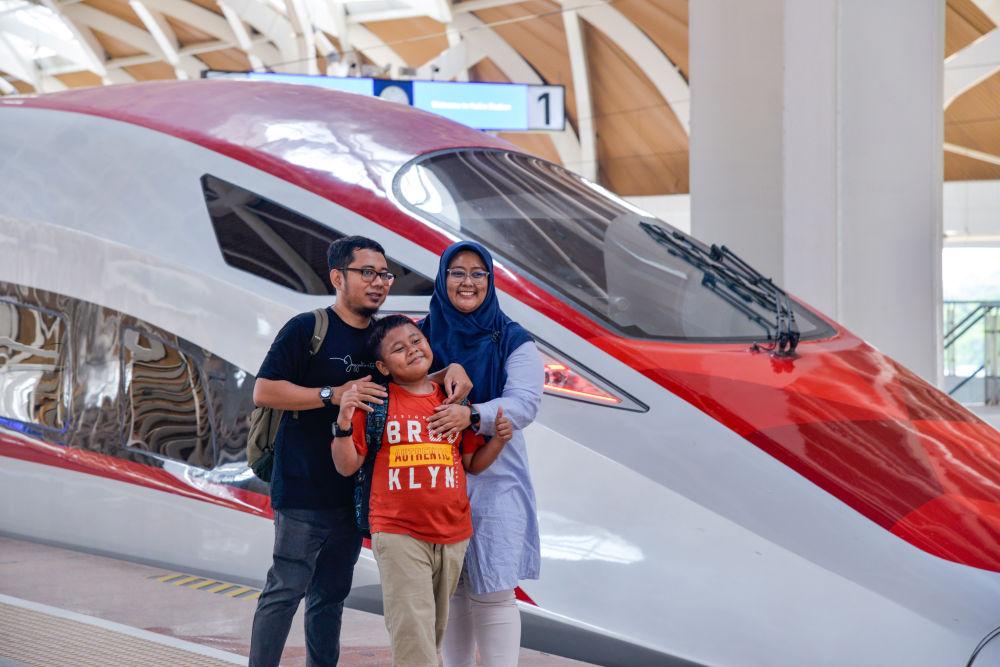
2024年4月17日,在印度尼西亚雅加达哈利姆站站台,乘客和一列雅万高铁高速动车组合影。新华社记者 徐钦 摄
印度尼西亚人民协商会议主席班邦·苏萨蒂约说,习近平主席提出共建“一带一路”倡议,将世界不同地区通过供应链连接起来,这样的构想令人叹为观止。

这是中哈合作的哈萨克斯坦札纳塔斯100兆瓦风电项目(2022年9月13日摄)。新华社发(德米特里·瓦西连科 摄)
海外人士认为,习近平主席提出推动构建人类命运共同体理念,提出共建“一带一路”、全球发展倡议、全球安全倡议、全球文明倡议、共商共建共享的全球治理观等一系列重要倡议和理念,为积极应对全球性挑战贡献了中国智慧、提供了中国方案,为推动人类文明进步、创造人类文明新形态绘就了恢弘蓝图。
“习近平是一位为推动解决人类面临的重大问题提供愿景和规划的大国领导人。”英国国际关系专家基思·贝内特这样评价。
厄瓜多尔前总统吉列尔莫·拉索说,世界正面临多重机遇与挑战,只有增强“命运与共”意识,才能增进全人类共同福祉。中国提出全球发展倡议、全球安全倡议、全球文明倡议,展现了负责任大国的担当,为各国进行平等对话、实现和平发展提供了启迪。“习近平主席提出的构建人类命运共同体理念为世界探索自由与和平的发展道路指明了方向。”拉索说。
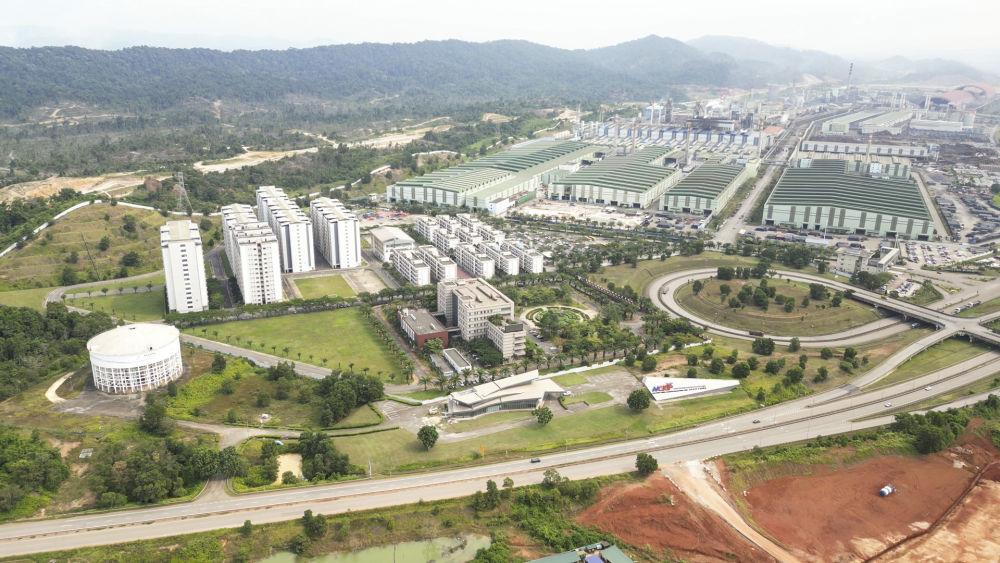
这是2024年6月13日在马来西亚彭亨州拍摄的马中关丹产业园(无人机照片)。新华社记者 程一恒 摄
马来西亚新亚洲战略研究中心理事长许庆琦说,二战结束后,西方逐步建立并主导了全球治理体系,目的是维护西方自身利益。所有国家必须追随西方,否则就会被西方视为对立面。相比之下,中国提出的构建人类命运共同体理念是包容的。“这一理念超越了国家层面,是从全人类的高度处理国际体系。”许庆琦说。
全球化概念首倡者之一的英国社会学家马丁·阿尔布劳高度评价习近平主席提出的构建人类命运共同体理念以及为此进行的理论探索。他说,构建人类命运共同体理念融合了古老的中国智慧,全球的美好未来需要全世界人民共同努力,期待中国在这方面发挥带头作用。
Why global observers see Xi as a visionary leader committed to reform
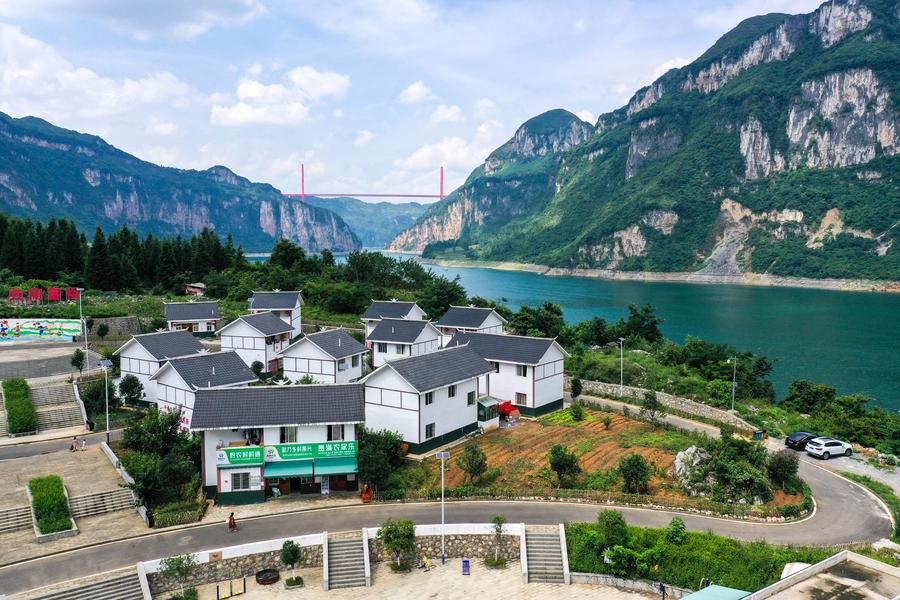
An aerial drone photo taken on July 24, 2021 shows a view of a relocation site for poverty alleviation at Huawu Village in Xinren Miao Township, Qianxi City, southwest China's Guizhou Province. (Xinhua/Yang Wenbin)
* Many overseas observers have noted that, under Chinese President Xi Jinping's leadership, China will continue to sail with reaffirmed commitment to reform and opening-up.
* In their interviews with Xinhua, overseas observers have regarded China's reform initiatives and its path of modernization as valuable lessons for the developing world.
"Today, the Chinese people can say with great pride that reform and opening-up, China's second revolution if you like, has not only profoundly changed the country but also greatly influenced the whole world," said Chinese President Xi Jinping at the opening ceremony of the Boao Forum for Asia annual conference in 2018.
This statement was made as China was commemorating the 40th anniversary of its reform and opening-up, which has long been described as a "crucial move" that has made China what it is.
As the Third Plenary Session of the 20th Communist Party of China (CPC) Central Committee is being held in Beijing from Monday to Thursday, observers are particularly keen to gain insights from Xi's perspective on deepening reforms.
Many overseas observers have noted that, under Xi's leadership, China will continue to sail with reaffirmed commitment to reform and opening-up.
ACT BOLDLY and PROGRESS STEADILY
Advancing reform in a country of 1.4 billion people is extremely challenging.
"It can be said that the easy part of the job has been done to the satisfaction of all. What is left are tough bones that are hard to chew. This requires us to act boldly and progress steadily," Xi said in an interview with foreign media in 2014.
Reform is driven by problems and deepens through solving these problems, said Hwang Jaeho, director of South Korea's Institute for Global Strategy and Cooperation.
Xi's statement on "acting boldly and progressing steadily" to tackle new problems in the process of reform "left a deep impression on me," said Hwang. He also noted that in that same interview with foreign media, Xi expressed "full confidence in the prospects for China's development."
Charles Onunaiju, director of the Center for China Studies in Nigeria, said that a visionary leader must have the foresight and insight to perceive the opportunities and the challenges to improve society.
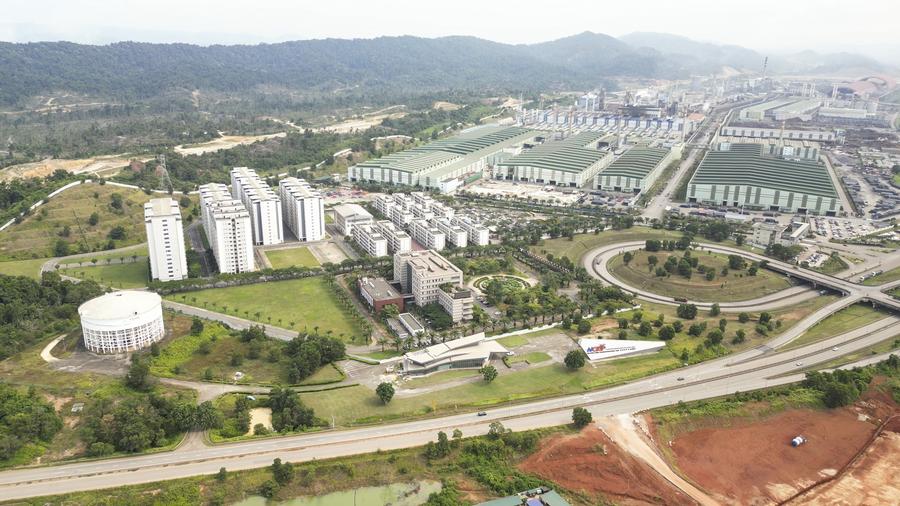
An aerial drone photo taken on June 13, 2024 shows the Malaysia-China Kuantan Industrial Park (MCKIP) in Pahang state of Malaysia. (Xinhua/Cheng Yiheng)
In this regard, he said, Xi not only seizes the opportunities presented by reforms but also adeptly manages the associated risks and challenges, taking necessary measures.
For over a decade, Xi has spearheaded over 3,000 reform plans across various sectors, including the economy, politics, culture, society, ecology, party building, national defense, and the military.
Paul Frimpong, executive director of the China-Africa Center for Policy and Advisory, noted that the reforms led by Xi have covered a wide range of fields, and have responded to the internal and external challenges facing China timely and effectively.
Over the past years, China's reform has made solid progress and continuous breakthroughs in various fields. Erik Solheim, co-chair of the Europe-Asia Center and former under-secretary-general of the United Nations, spoke highly of China's achievement on green development.
"China is now the core of global green development and an indispensable force in the global green transformation," said Solheim, noting that countries seeking green development without cooperating with China will "pay more time and cost."
CHINESE WISDOM, VALUABLE LESSONS
In their interviews with Xinhua, overseas observers have regarded China's reform initiatives and its path of modernization as valuable lessons for the developing world.
Since the 18th CPC National Congress, China's comprehensive deepening of reforms has advanced with a focus on the people's welfare. Xi has emphasized that the ultimate goal of reform is for the people's well-being, pledging to make people's priorities his own and act on their wishes.
The people-centered approach is reflected in the institutional arrangement of equity and justice and the practical style of hard work, said Chea Munyrith, president of the Cambodian Chinese Evolution Researcher Association.
Humphrey Moshi, director of the Center for Chinese Studies at the University of Dar es Salaam of Tanzania, said that the people-centered development concept has achieved remarkable results in various fields such as medical care, education, poverty alleviation, and rural development in China.
"Whilst President Xi's people are the Chinese people, it is also the people of the world," said Stephen Perry, Stephen Perry, honorary president of Britain's 48 Group Club.
Xi understands "the dialectic and contradiction" and is capable of "finding the ways forward and through the maze of Marxism" for China's development, said Perry.
During his state visit to Kazakhstan early this month, Xi and Kazakh President Kassym-Jomart Tokayev presided over the opening ceremony of a road transport route to a Caspian Sea port via video link, bolstering Kazakhstan's efforts to improve its connectivity.
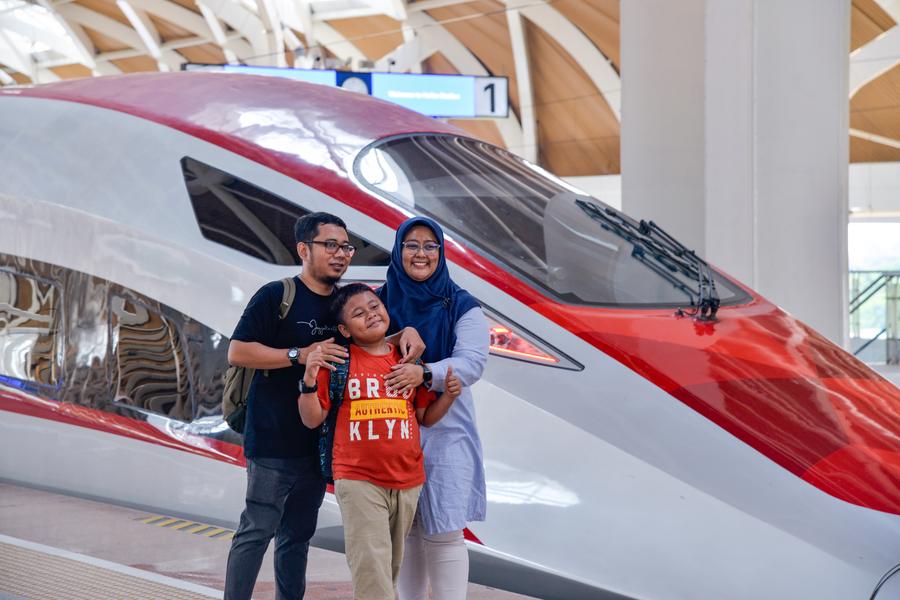
Passengers pose for photos with a high-speed electrical multiple unit (EMU) train of the Jakarta-Bandung high-speed railway on the platform of Halim Station in Jakarta, Indonesia, April 17, 2024. (Xinhua/Xu Qin)
Xi first proposed the initiative of the Silk Road Economic Belt, an essential component of the Belt and Road Initiative (BRI), in September 2013 in Kazakhstan.
So far, China has signed BRI cooperation agreements with more than 150 countries and over 30 international organizations.
International observers have lauded President Xi's vision of building a community with a shared future for humanity. They say the initiatives proposed by China, including the BRI, the Global Development Initiative, the Global Security Initiative, and the Global Civilization Initiative, have reflected China's wisdom in addressing global challenges and its blueprint for advancing human civilization.
Former Ecuadorian President Guillermo Lasso noted that by proposing the initiatives, China has demonstrated its role as a responsible major country and provided inspiration for countries to engage in dialogue on an equal footing and achieve peace and development.
Koh King Kee, president of the Center for New Inclusive Asia of Malaysia, offered a critical perspective on the post-World War II global governance system, which he argued was established and dominated by the West to safeguard its own interests. Koh said nations have been compelled to align with Western directives or risk being seen as adversaries.
In contrast, Koh highlighted China's vision of building a community with a shared future for mankind as an inclusive alternative.
Koh said this concept transcends national boundaries and addresses the international system from a universal human perspective.

